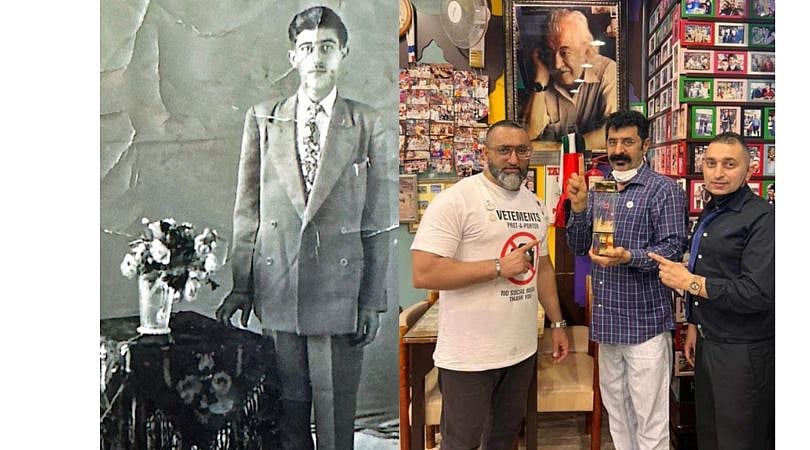Dubai’s oldest Iranian restaurant at 47: How one man’s 1940s dream became a family legacy beyond kebabs
Mohammad Ali Ansari watched a city rise before his eyes, before he set up Al Ustad

How do you use the past tense to speak about someone so present?
But the sons of Mohammad Ali Ansari, the founder and owner of one of the most cherished Iranian restaurants in Dubai, on Al Mussallah Rd - near Al Fahidi, persevere. Their father and his lessons still live in them: And you almost hear him in every story, word, laugh and sigh.
After all, the dead are never truly dead until we forget them.
And, even if might not have had a chance to meet him, but you still know him closely after speaking to both Majeed, and Abbas, who carry on his legacy that extends far beyond just kebabs in Dubai.
The beginning of it all
I speak to Abbas, now in Canada, and his brother Majeed, both brimming with stories of their father and the restaurant. With much emotion, Abbas recalls how his father moved to Dubai in 1941 at the age of nine, when there were only around 5,000 people living near the Dubai Creek. It was also a time when Abra rides were around 25 fils.
And, the roads were a far cry from the smooth pathways they are now, explains Abbas.
A family business
After several jobs that ranged from working in a grocery store, and trading with the Iranian government, he started the Al Ustadi restaurant in 1978. As Majeed emphatically says, “We’ve been in Dubai, and day by day, it’s getting better.’
“My mother made the food in the house, as my father was not a kitchen guy,” says Majeed. And they began with just three workers, a team that would later become 36.
“The first few years were rather turbulent,” recalls Abbas. Dubai was still building itself; and so the little outlet began in a small way, with Ali Ansari serving the customers themselves, along with a dedicated staff. “We began with mutton yoghurt, and then kebabs, and my mother made fish fry, which my father would sell. Everything my mother would make,” says Majeed.
Their world revolved around this little haven. All roads led here, even when they were just six-years-old. “I was a naughty child at home, so my mother used to send me to the restaurant and sit by the big fridges. She would say ‘You can hear people, but you can’t see them’,” says Abbas. On the other hand, Majeed would ride around on a bicycle, near the shop. “I studied in the Iranian school right here,” he says.
This is where Ali Ansari ‘built’ his sons. Abbas recalls on how he just learnt, watching his father build a cultural milestone from scratch. “That’s how I began. I would wash the dishes, and cut the meat. I have done work from really the basic core,” he says.
Memories on the wall
Hearing these stories gives a fresh meaning to the word ‘core,’ especially when he shares how his mother used to wash the clothes of the closely-knit staff. But Ali Ansari never wanted to open a branch; a message that is printed in bold on the restaurant doors itself. As Abbas says, “He felt that it was real greed to do so.” Ali Ansari’s principles were simple: You’ve been given a house, and a wife, children, why do you keep asking for more?
And as we walk through the restaurant that has seen a city rise with it, I can hear Ali Ansari’s words. The real food here is memories: Photos are plastered all across the room, each with distinct flavours. Across some walls, are photos of him beaming with his sons. On others, are photos with different celebrities, proud moments and framed articles.
A legacy beyond food
The buttery kebabs arrive sizzling, the air fragrant with spices that tell stories of decades past. As Majeed says, he might have six blood brothers, but in this outlet, everyone’s a brother. In fact, as Abbas mentions, there is still one staff member from 1978, who comes by for a few hours in the day.
When Ali Ansari passed away in Iran in 2015 at the age of 83, Abbas recalls how his world practically shook. “I was behind the fridges in the restaurant, and I started crying. We told the customers to finish eating, and then we left immediately,” he notes. But the legacy he left behind was so vast that generations of customers still feel a strong connection to him, remembering his words, jokes, and laughter.
Abbas shares a particular story: a customer once noticed a black ribbon on Ali Ansari’s photo, signaling his passing. He took Abbas aside and asked, “Where is your father?” Abbas explained, and the customer, who had been abroad for years, said he still remembered Ali as a kind man who had once helped him when he forgot money at the restaurant.
Al Ustad is just proof that some people never truly leave—they just live in the stories, flavours, and hearts they touch.
Network Links
GN StoreDownload our app
© Al Nisr Publishing LLC 2026. All rights reserved.